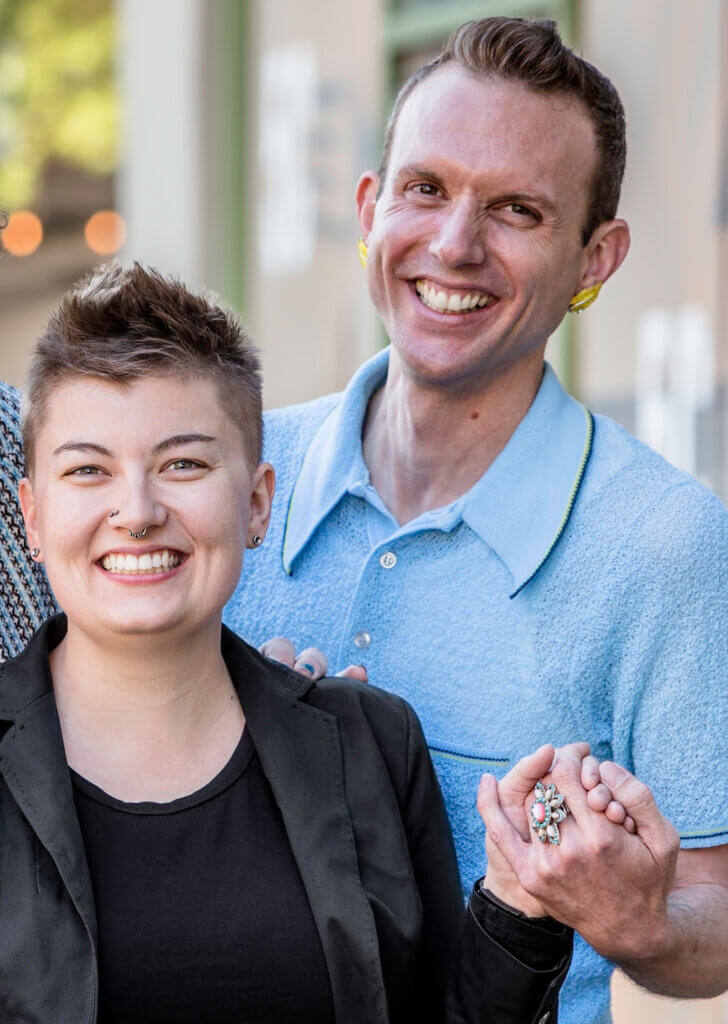The importance of advance directives in the transgender community
While it’s important for everyone to plan for the future, legal plans are especially vital for a person diagnosed with dementia. The sooner these plans are put in place, the more likely it is that the person living with dementia will be able to participate in the process. Ames Simmons, a transgender man, shares why it is important for the LGBTQ+ community and especially the transgender community to have a say in the gender-affirming care they receive as the disease progresses.
Not hiding who you are
Ames Simmons is a policy attorney who has worked for transgender equality and has spent much of his career helping uninsured patients with Medicaid. He currently holds a senior fellowship at Duke University School of Law and is working towards a graduate certificate in LGBT Health Policy & Practice at George Washington University.
In 2014, when Ames was working through his gender transition, he attended a presentation about what could happen to transgender people at the end of their life as they age and get sick. Ames learned that for many in the community, they felt they had no other option than to de-transition and return to their sex assigned at birth.
“I started worrying about that for myself,” said Ames. “There has to be a better answer than for people to hide who they are. For a lot of trans people, that’s a non-starter. It doesn’t seem livable if you’re not in your gender.”
After the presentation, Ames wondered what he could do to help not only himself but also other trans people that want to remain who they are throughout their entire life. Turning to his background in law, he thought of the advance directive and what he could add to that document to ensure people receive gender-affirming healthcare, even after they are unable to make the decisions on their own.
Going back to school
Despite his good intentions, Ames was a busy man, and while he would think about advance directives from time to time, he didn’t have the time to focus on it. That is until 2020 when the pandemic forced the world to pause. “When COVID-19 took over, Transgender Law Center released a life document resource,” said Ames. “It had many of the same provisions I was already thinking about. Many things were put on hold [during the pandemic], but this was something I wanted to get back to.”
Ames went back to school and is still currently attending George Washington University where he made transgender advance care planning his capstone project. Ames says, “[The number of] people over 65 is going to increase and along with that comes the increase in Alzheimer’s.
“I’m really grateful that I had the graduate education space that I could develop this resource. Once I turn it in, it needs to get disseminated to the community. I don’t think trans people are aware of dementia risk or planning for it.”
Impact on health care
According to the Alzheimer’s Association® and SAGE, Issues Brief: LGBT and Dementia, 2.7 million LGBT people are over age 50. Thirty percent of LGBT adults living with dementia experience lower rates of access to care. Additionally, 40% say their health care providers don’t know their sexual orientation.
Ames worries about the increased risk in the LGBTQ+ community. The Issues Brief reports that LGBT older adults exhibit several health disparities, such as diabetes and high blood pressure, which increase the risk of developing Alzheimer’s and other dementias.
For transgender elders, the reality is especially stark. Transgender people face particular barriers as they access health services, and often cannot selectively hide or disclose their transgender status, especially when seeking medical care or assistance with tasks such as bathing and dressing.
This has real implications for their health care: Two-thirds of transgender adults feel that there will be limited access to health care as they grow older. A 2015 survey by the National Center for Transgender Equality (NCTE) found that 50% of respondents experienced rejection from an immediate family member, 33% reported a negative interaction with a medical provider during the past year and 23% did not see a doctor when they needed to or seek out medical care for fear of being mistreated.
“There is a long history of violence and mistreatment in healthcare that goes back to how we medicalized trans people’s access,” said Ames. “There is fear about bias and discrimination that might occur. That’s true for any stage of life but especially true when you’re older you’ll be more vulnerable.”
His father’s death
Education wasn’t the only thing to change for Ames during the pandemic. Sadly, his father also died during this time. “We discovered in the last two months of his life that he had rapidly advancing cognitive decline,” said Ames. “It was unsettling. You’re accustomed to think your parents are in charge and the ones you go to when things are uncertain.”
It was because of this experience that Ames became motivated to do something about his own end-of-life care. “I don’t know if the dementia [my father] had is genetic or inheritable or if I have an increased risk of the same type he had,” said Ames. “It makes it personal to me that I try to do something while I still legally retain the capacity to make those documents.”
Sharing his knowledge
This past spring, the Alzheimer’s Association held a panel on aging in the LGBTQ+ community and Ames was asked to speak there. “I think that me holding this knowledge in my head is not doing the world the kind of good that it could do,” said Ames. “I think this one of the most impactful things I can do with the project I’m working on is raising awareness to organizations that talk to trans people about dementia.”
Ames encourages anyone from the LGBTQ+ community to reach out to the Alzheimer’s Association for more resources on dementia.
Seriously consider advance directives
While everyone’s needs are different Ames expresses the importance for all people, not just the LGBTQ+ community, to fill out an advance directive. “It’s good health planning,” said Ames. “It requires work on the front end to get to a functional advance directive.
“Advance directives are largely a creature of state law. Every state has some statutory form for advance directive. A living will with treatment preferences often contain financial and durable power of attorney. I started thinking about how I understand my own gender and what am I worried about happening if I enter cognitive decline and become unable to advocate for myself.
“[I want to] be able to dress as the man I know myself to be. To get hormone replacement therapy I’ve been taking since 2015. There is no reason why you couldn’t include clauses to continue that treatment in an advance directive. There’s nothing prohibiting anyone of thinking in advance of how they understand their gender identity and to what extent they want to preserve that after they lose cognitive capacity.”
Here are a few things for the transgender community to think about before filling out your advance directive:
- What are my values around my gender expression?
- How do I understand my gender identity to be?
- Do I understand my gender in a more fluid way?
- Do I want my caregivers to respect my gender fluidity in the event that I’m no longer legally capable to advocate?
- Where are the affirming health providers?
- Do you want to continue to receive hormone replacement therapy?
- Who will you designate as your power of attorney? It doesn’t have to be someone from your family of origin, it can be someone from your chosen family.
Including gender-affirming care
Personally, Ames has put many of the above suggestions into his own advance directive. He even included a specific clause about what he wants should he get dementia. “I want gender-affirming care to continue in the event that I can’t do it for myself,” said Ames. “In addition to possibly making sure what I want happens in the future, it gives me peace of mind today.
“I’ve thought about this and done something about it while I have control over my gender identity and expression. I made sure I appointed someone who knows me well and I trust. It’s my chosen family.”
Isolation in the community
The Issues Brief shares that 34% of LGBT adults living with dementia live alone. Forty percent report that their support networks have become smaller over time. For someone from the LGBTQ community it may not be obvious who to name as your power of attorney.
“Isolation is significant in the community, worse from COVID-19,” said Ames. “When your support network is already thin it makes this easier to fall to the bottom of a priority list. When you need a job or your housing isn’t certain, then these documents won’t be at the top of people’s priority list.
“We need to start thinking about this earlier. This is why we need to maintain and develop a social network. We are less likely to have a family of origin and less likely to have children that would be obvious caregivers.”
People that care
A recent study Ames came across discussed that the transgender community deals with violence on a regular basis. Because of this, many of them have not thought about an advance directive because they don’t believe they will live long enough to need one.
“I think it’s important to think about the possibilities where there might be a happy and fulfilling future as a trans person,” said Ames. “There are people in the trans and non-binary community that care about what happens to you. Who want to make sure you’re able to live as authentically as you want to as long as you want to. It’s about community care, the most important places for us to get resilience.”
Creating a plan for your future in the early stage of the disease can be empowering and ensure your wishes are met. The sooner you establish your legal plans, the better prepared you and your family will be. You can then focus on enjoying your life moving forward. Visit our website for more information.
At the Alzheimer’s Association, we believe that diverse perspectives are critical to achieving health equity — meaning that all communities have a fair and just opportunity for early diagnosis and access to risk reduction and quality care. For more information on LGBTQ+ dementia resources visit alz.org/lgbtq.




















